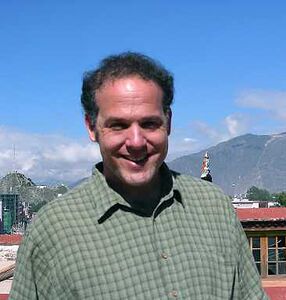Blumenthal, J.: Difference between revisions
No edit summary |
m (Text replacement - "{{DRL Authors of English Works}}" to "") |
||
| (3 intermediate revisions by 2 users not shown) | |||
| Line 18: | Line 18: | ||
|yearbirth=1967 | |yearbirth=1967 | ||
|yeardeath=2014/10/08 | |yeardeath=2014/10/08 | ||
|bio= | |bio=Born in Los Angeles, Jim grew up in Southern California. He completed his undergraduate degree at the University of San Diego and continued to the University of Wisconsin, Madison, where he finished his MA and PhD under the direction of the Tibetan Buddhist scholar/practitioner Geshe Lhundub Sopa. His graduate studies focused on the work of the Indian teacher Śāntarakṣita. | ||
Both in his career as Associate Professor in the School of History, Philosophy and Religion at Oregon State University and as Professor of Buddhist Studies at Maitripa College, Jim displayed the rare combination of deep commitment to teaching and rigorous engagement as a research scholar. Even more unusually, Jim was able to produce scholarly texts that were valued equally by the academy and by Buddhist communities. He published analytical and translation works on Indian Mahāyāna Buddhism based upon this research, including The Ornament of The Middle Way: A Study of the Madhyamaka Thought of Śāntarakṣita (2004) and Sixty Stanzas of Reasoning (2004). With Geshe Sopa, he completed a translation of the 4th Chapter of the ''Lamrim Chenmo'', and was pursuing the publication of a translation of Śāntarakṣita’s ''Madhyamakālaṃkāravṛtti''. | |||
Jim was a strong advocate for institutions of higher education that strive to integrate the knowledge base of Buddhist philosophy with meditative practice and service to the community. In 2004, Jim invited Yangsi Rinpoche to Portland, Oregon to speak to interested persons. In 2005, Jim began working alongside Yangsi Rinpoche, Namdrol Adams, and Angie Garcia on the founding of Maitripa Institute, soon to become Maitripa College, which seeks to embody those ideals. . . . | |||
His main teachers were His Holiness the Dalai Lama, Geshe Lhundub Sopa Rinpoche, Jangtse Choje Rinpoche, Choden Rinpoche, Lama Zopa Rinpoche, Yangsi Rinpoche, and Chokyi Nyima Rinpoche. ([https://maitripa.org/jim-blumenthal/ Source adapted from an obituary written by Namdrol Miranda Adams, Damcho Diana Finnegan, and Jim's wife, Tiffany)] | |||
His main teachers were His Holiness the Dalai Lama, Geshe Lhundub Sopa Rinpoche, Jangtse Choje Rinpoche, Choden Rinpoche, Lama Zopa Rinpoche, Yangsi Rinpoche, and Chokyi Nyima Rinpoche. | |||
by Namdrol Miranda Adams | |||
|affiliationsecondary=Oregon State University; Maitripa College | |affiliationsecondary=Oregon State University; Maitripa College | ||
|religiousaffiliation=Gekuk; Tibetan Buddhism | |religiousaffiliation=Gekuk; Tibetan Buddhism | ||
| Line 73: | Line 47: | ||
== Publications == | == Publications == | ||
Latest revision as of 09:30, 7 June 2024
| PersonType | Category:Professors Category:Translators Category:Authors of English Works |
|---|---|
| FirstName / namefirst | James |
| LastName / namelast | Blumenthal |
| namemiddle | Alan |
| namealt | Jim |
| bio | Born in Los Angeles, Jim grew up in Southern California. He completed his undergraduate degree at the University of San Diego and continued to the University of Wisconsin, Madison, where he finished his MA and PhD under the direction of the Tibetan Buddhist scholar/practitioner Geshe Lhundub Sopa. His graduate studies focused on the work of the Indian teacher Śāntarakṣita.
Both in his career as Associate Professor in the School of History, Philosophy and Religion at Oregon State University and as Professor of Buddhist Studies at Maitripa College, Jim displayed the rare combination of deep commitment to teaching and rigorous engagement as a research scholar. Even more unusually, Jim was able to produce scholarly texts that were valued equally by the academy and by Buddhist communities. He published analytical and translation works on Indian Mahāyāna Buddhism based upon this research, including The Ornament of The Middle Way: A Study of the Madhyamaka Thought of Śāntarakṣita (2004) and Sixty Stanzas of Reasoning (2004). With Geshe Sopa, he completed a translation of the 4th Chapter of the Lamrim Chenmo, and was pursuing the publication of a translation of Śāntarakṣita’s Madhyamakālaṃkāravṛtti. Jim was a strong advocate for institutions of higher education that strive to integrate the knowledge base of Buddhist philosophy with meditative practice and service to the community. In 2004, Jim invited Yangsi Rinpoche to Portland, Oregon to speak to interested persons. In 2005, Jim began working alongside Yangsi Rinpoche, Namdrol Adams, and Angie Garcia on the founding of Maitripa Institute, soon to become Maitripa College, which seeks to embody those ideals. . . . His main teachers were His Holiness the Dalai Lama, Geshe Lhundub Sopa Rinpoche, Jangtse Choje Rinpoche, Choden Rinpoche, Lama Zopa Rinpoche, Yangsi Rinpoche, and Chokyi Nyima Rinpoche. (Source adapted from an obituary written by Namdrol Miranda Adams, Damcho Diana Finnegan, and Jim's wife, Tiffany) |
| YearBirth | 1967 |
| YearDeath | 2014/10/08 |
| associatedwebsite | https://liberalarts.oregonstate.edu/users/james-blumenthal |
| affiliationsecondary | Oregon State University; Maitripa College |
| religiousaffiliation | Gekuk; Tibetan Buddhism |
| education |
|
| IsInGyatsa | No |
| Other wikis |
If the page does not yet exist on the remote wiki, you can paste the tag |
Other Information
Obituary
http://oregonstate.edu/dept/ncs/lifeatosu/2014/osu-buddhist-scholar-james-blumenthal-dies-at-47/
liberalarts.oregonstate.edu/users/james-blumenthal
OLD BIO: James Blumenthal is an associate professor of Buddhist philosophy at Oregon State University and founding faculty member in Buddhist Studies at Maitripa College. He is the author of The Ornament of the Middle Way: A Study of the Madhyamaka Thought of Santaraksita (2004), editor of Incompatible Visions: South Asian Religions in History and Culture (2006), co-author and editor with Geshe Lhundup Sopa of Steps on the Path: A Commentary on the "Shamatha" Chapter of Tsongkhapa's Lamrim Chenmo in addition to more than 40 articles in academic journals, books, and popular periodicals on various aspects of Buddhist thought and practice. In 2004 he had the honor of translating Nagarjuna's "Sixty Stanzas of Reasoning" for His Holiness the Dalai Lama on the occasion of his public teachings on the text in Pasadena, California. Source (Accessed June 12, 2012)

